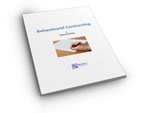 Many new coaches wonder how to structure sessions to ensure maximum benefit is gained by the Coachee. The following structure is adapted from that used in Cognitive-Behavioural Therapy. The Cognitive-Behavioural Coaching model is a popular one due to its natural leaning towards a focused, skill based approach with individuals.
Many new coaches wonder how to structure sessions to ensure maximum benefit is gained by the Coachee. The following structure is adapted from that used in Cognitive-Behavioural Therapy. The Cognitive-Behavioural Coaching model is a popular one due to its natural leaning towards a focused, skill based approach with individuals.
First Meeting
- Confirm Coaching arrangements and the client’s own understanding of the terms and conditions under which coaching is offered together with an outline of the coaching process. For example, the importance of a collaborative relationship between you and the Coachee, how coaching is skill based etc.
- Ask the Coachee what he or she wants to achieve from the Coaching process – in other words why have they come to see you?
- Following on from 2 above, the Coachee comes up with his or her Agenda/problem list of those items that require change, development and action.
- Once the Agenda has been set work begins in the session on ways of moving forward. In the first session the Coachee may use the time to clarify his or her thinking as well as identifying action points
- Set Coaching Assignment with client. The assignment is likely to have grown organically out of discussions in the session. However, as coaching is an overt process it is important the Coachee be clear about what he or she is trying to achieve and the steps required to attain the successful outcome sought.
- Ask for feedback from Coachee as his or her perception of the session and of your coaching style. For many coaches this can seem a rather scary process. However, coaching is meant to be a proactive and collaborative process and, as such, it is important the Coachee develop ways of evaluating his/her own strengths and weaknesses as well as having an opportunity of reflecting on the coaching process and your contributions as the coach. If the Coachee is unhappy about anything in the coaching relationship it is better that it is dealt with early on than left to compound.
Next week, I’ll discuss how to structure subsequent coaching sessions and reviews.
You may be interested in the ‘Introduction to Cognitive Behavioural Coaching’ Quick Start Guide.






